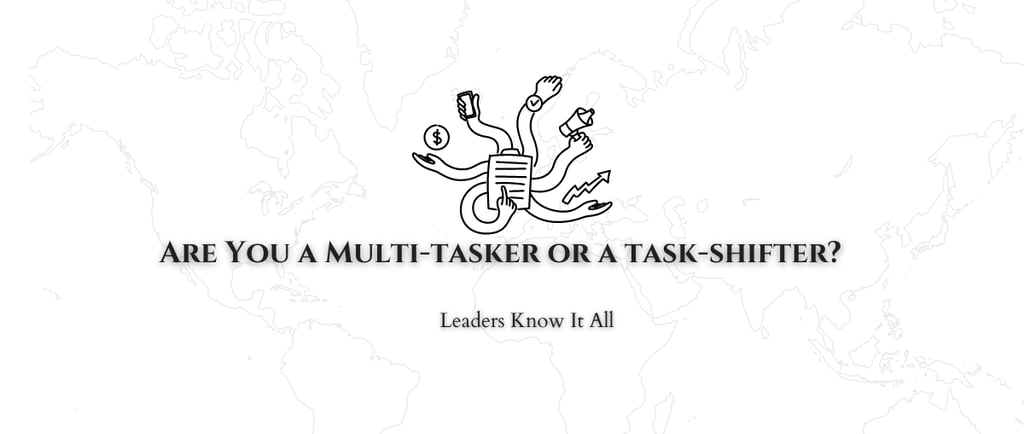Are You a Multi-tasker or a task-shifter?
Research has shown that shifting attention from one task to another results in a loss of momentum and rhythm, ultimately wasting time. Each time a task is interrupted, it requires an increased amount of time and energy to regain focus and complete the task effectively. Studies have proven that those who claim to be effective multitaskers are actually task-shifters, expending unnecessary energy.
HOW TO BECOME SUCCESSFULLEARN FROM LEADERSSUCCESSEFFECTIVE PLANNINGTIME MANAGEMENTTIME MANAGEMENT SKILLSMANAGEMENT SKILLSHOW TO ORGANIZE YOURSELF
leaders know it all
5/18/20242 min read


Are You a Multi-tasker or a task-shifter?
Are you attending an important phone call while drafting a crucial mail?
Are you preparing an Excel sheet while having an important meeting?
Are you engaged in a conversation while drafting a mail and simultaneously attending a meeting? Making efficient use of both your ears?
Are you exercising on a treadmill while watching a TED talk and brainstorming ideas for your project?
If you are good at multitasking and you think that it can be effectively done, then go for it but just remember, do not leave one task undone to complete another.
Research has shown that shifting attention from one task to another results in a loss of momentum and rhythm, ultimately wasting time. Each time a task is interrupted, it requires an increased amount of time and energy to regain focus and complete the task effectively. Studies have proven that those who claim to be effective multitaskers are actually task-shifters, expending unnecessary energy.
Just imagine a situation where you were drafting an important paper and you left writing it because you remembered that there was an important mail that you needed to send. While you were drafting the mail, you received a call from your manager to send them some important work that has to be delivered in the next 2 days. You started working on that and there is a Teams pop-up that divided your attention and you had to attend to an important request.
The concept of multitasking, the ability to perform multiple tasks simultaneously, has been a topic of debate. Some believe it leads to increased efficiency, while others argue it can be draining and counterproductive. In his book "Time Management," Brian Tracy emphasizes the importance of concentrating on a task single-handedly, suggesting that undivided attention is essential for effective task completion.
Concentration is extremely important for accomplishing tasks efficiently. According to Tracy, discipline is essential for maintaining focus. By allocating time to tasks based on their priority and avoiding distractions, we can enhance our productivity. Tracy also recommends allowing a buffer (at least 30 %) to account for unexpected interruptions, further emphasizing the need for undivided attention during task completion.
Furthermore, according to USA Today, multitasking can lead to a progressive decline in mental acuity/ IQ, resulting in burnout and indecisiveness. The idea is plain and simple- meticulous planning, task segregation, and focused attention on the most critical tasks are needed for efficient tasking. By eliminating distractions and unnecessary tasks, we can optimize our time and energy, ultimately doubling our efficiency.
Evidence supports the notion that single-handedly concentrating on a task leads to increased efficiency, while multitasking can result in energy depletion and decreased productivity.
To maximize their effectiveness and achieve optimal results:
PRIORITIZE TASKS
AVOID DISTRACTIONS
FOCUS ON ONE TASK AT A TIME
So, the next time when you think that you are multitasking, also think if you are doing full justice to your work or just shifting your attention from one task to another.
Have a great day ahead!!!
Love and Light
LKIA
